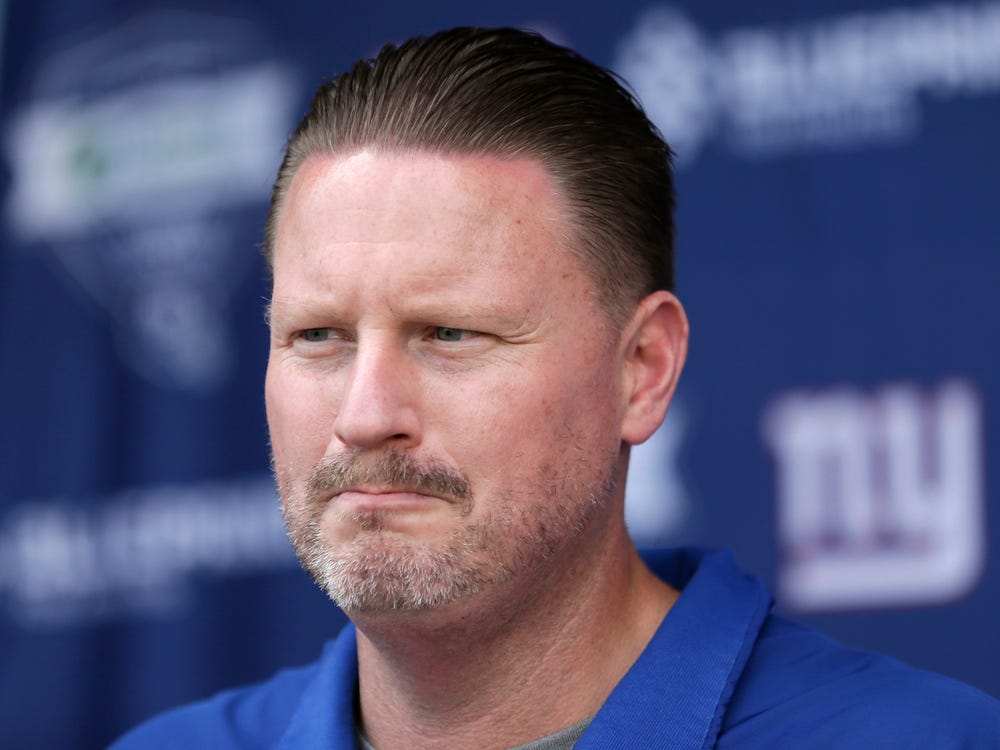When the Carolina Panthers set out on hiring a new offensive coordinator for the 2022 season, it was framed in a way that raised the expectations of fans and observers alike. After a season and a half of LSU wunderkind Joe Brady that provided far more hype than substance, Carolina intimated that it would seek a more experienced NFL mind capable both of lifting the Panthers’ offense from the doldrums and leading a unit that could develop into one of the NFL’s best over time.
On the surface, their search didn’t lead them to someone who fit that description and the visceral reaction to the news that the Panthers were hiring Ben McAdoo can hardly come as a surprise given the way in which this coaching search had been framed. Instead of a hot name and a fast riser, their preferred choice of playcaller has spent the last several years picking up the pieces of a career left in shambles and putting it back together largely under the radar following a very public failure of a tenure as the New York Giants head coach.
However, even if McAdoo doesn’t walk into the job one a tide of optimism, it’s important to understand just who the new Panthers’ offensive coordinator is and where he’s coming from, which shouldn’t not be confused for simply where he’s been. Here is a full background on Ben McAdoo, how he reached the heights as an offensive coach, how he fell so far, and why his hiring may ultimately be a sound one.
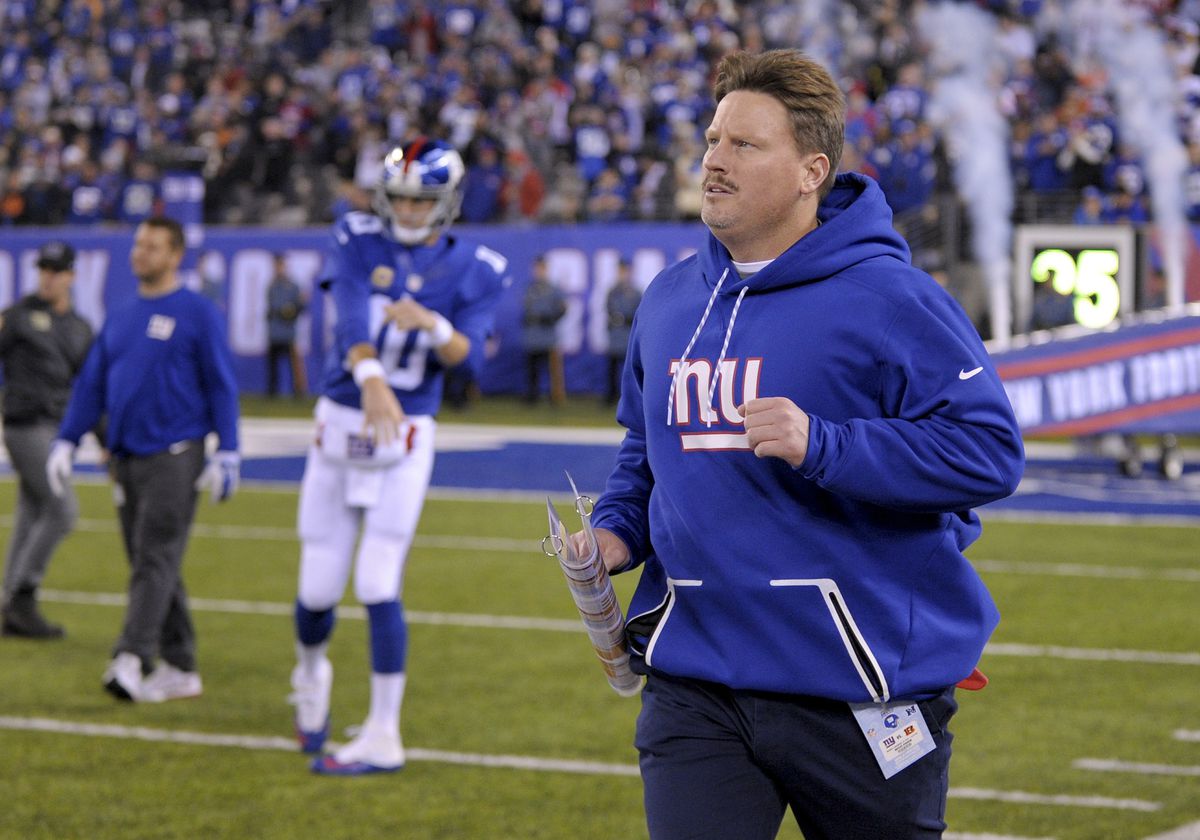
Photo Credit: Bill Kostroun/AP
After working as a graduate assistant at the college level, McAdoo broke into the NFL as an offensive quality control coach with the New Orleans Saints and San Francisco 49ers before getting his big break as the tight ends coach of the Green Bay Packers in 2006. An original member of Mike McCarthy’s Packers coaching staff, McAdoo was a pre-eminent member of a Green Bay offensive coaching staff that would win Super Bowl XLV in 2010 before being promoted to quarterbacks coach in 2012, where he spent two seasons working directly with MVP quarterback Aaron Rodgers.
It was from Green Bay that McAdoo was hired as the offensive coordinator of the New York Giants in 2014, joining the staff of Tom Coughlin– mentor to current Panthers head coach Matt Rhule. When he arrived at the Giants, McAdoo was tasked with overhauling an offensive system that had run its course under Kevin Gilbride, as well as with making a more efficient passer out of quarterback Eli Manning. The season before McAdoo’s arrival, the Giants were just beginning to struggle with personnel deficiencies as their Super Bowl-winning teams aged out, and an overmatched Manning had compounded things by throwing a staggering 27 interceptions.
Under McAdoo, Manning cut down on his interception rate and enjoyed some of his best statistical seasons, a development aided by the emergence of wide receiver Odell Beckham Jr. as a superstar and Manning’s go-to target. From 2014 to 2015, Manning completed 62.9 percent of his passes for 8,842 yards and 65 touchdowns, and the Giants would finish the 2015 season with the NFL’s sixth-ranked offense.
McAdoo’s performance as offensive coordinator was enough that the Giants promoted him to head coach following the 2015 season, replacing Coughlin after the two-time Super Bowl-winning coach took the fall for three-straight losing seasons.
So far, so good.
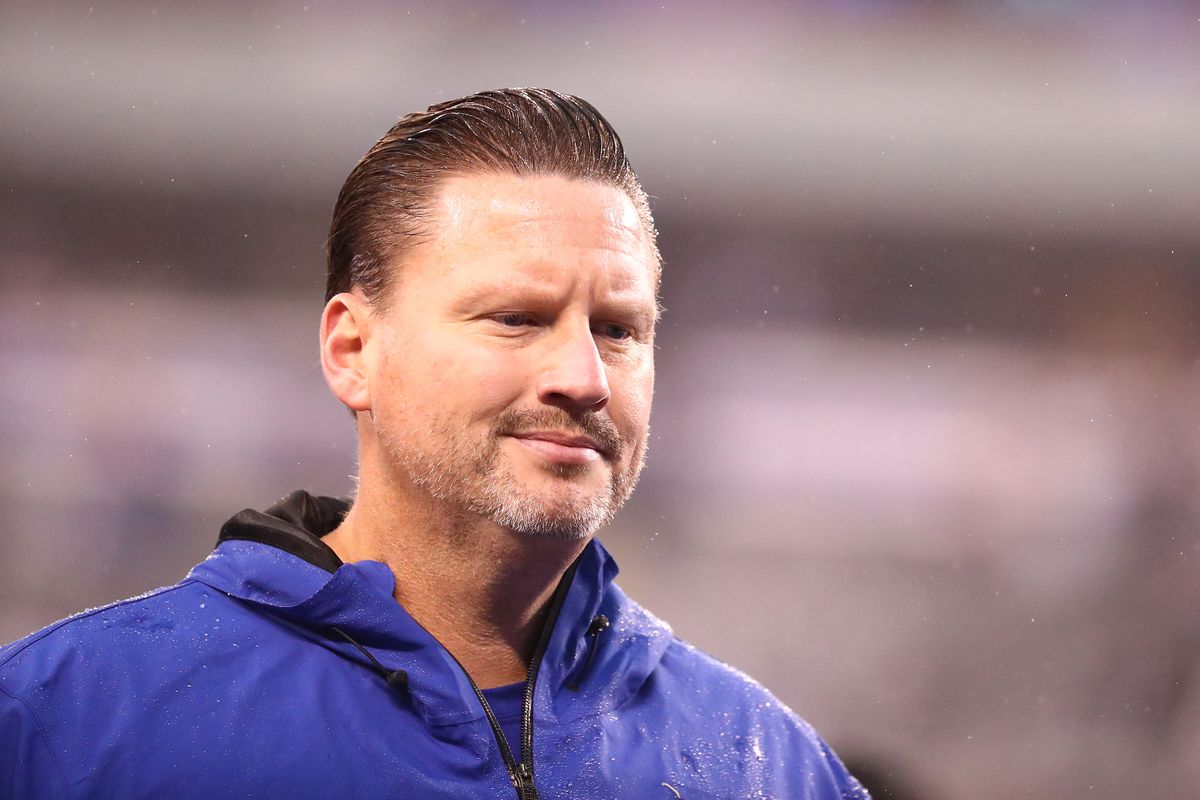
Photo Credit: Al Bello/Getty Images
For all he did well as the Giants’ offensive coordinator, things didn’t go quite as well when McAdoo was promoted to head coach.
Although the Giants went 11-5 and made the playoffs in McAdoo’s first season, the success of Big Blue was largely a product of a defensive turnaround while the offense slogged to a 26th-ranked finish. What success they did have was largely thanks to the individual brilliance of Beckham, rookie wide receiver Sterling Shepard, and the veteran savvy of Manning.
The problem was that McAdoo’s offense became overly-reliant on the same sorts of concepts: The Giants used 11-personnel groupings almost exclusively, trotting out three wide receiver sets for more than 90 percent of their plays. Slants and flats were a hallmark of the offense’s passing scheme, and it became all too easy for opposing defenses to predict what the Giants were going to do.
“The Ben McAdoo offense with the Giants was one of the more easily-adjusted to systems in the last decade once opposing defensive coordinators got film on it because it relied so heavily on 11 personnel (three wide receivers, one tight end, one back) and the slants/flats concept in the passing game,” Dan Schneier of CBS Sports and Big Blue Banter told The Riot Report. “If you had a WR who could win a one-on-one, it looked great — as we saw at times with Odell Beckham Jr. If you didn’t? Well, then it made the Jason Garrett Giants offense (ranked 31st in the NFL each of the past two seasons) look passable.”
Personnel deficiencies were also a major part of the issue: The Giants lacked dynamic running backs or tight ends, and their offensive line – headlined by left tackle Ereck Flowers – was woeful. Still, the team’s record and high-end talent was enough to inspire belief that the Giants would be okay, and they could achieve similar or greater success in 2017.
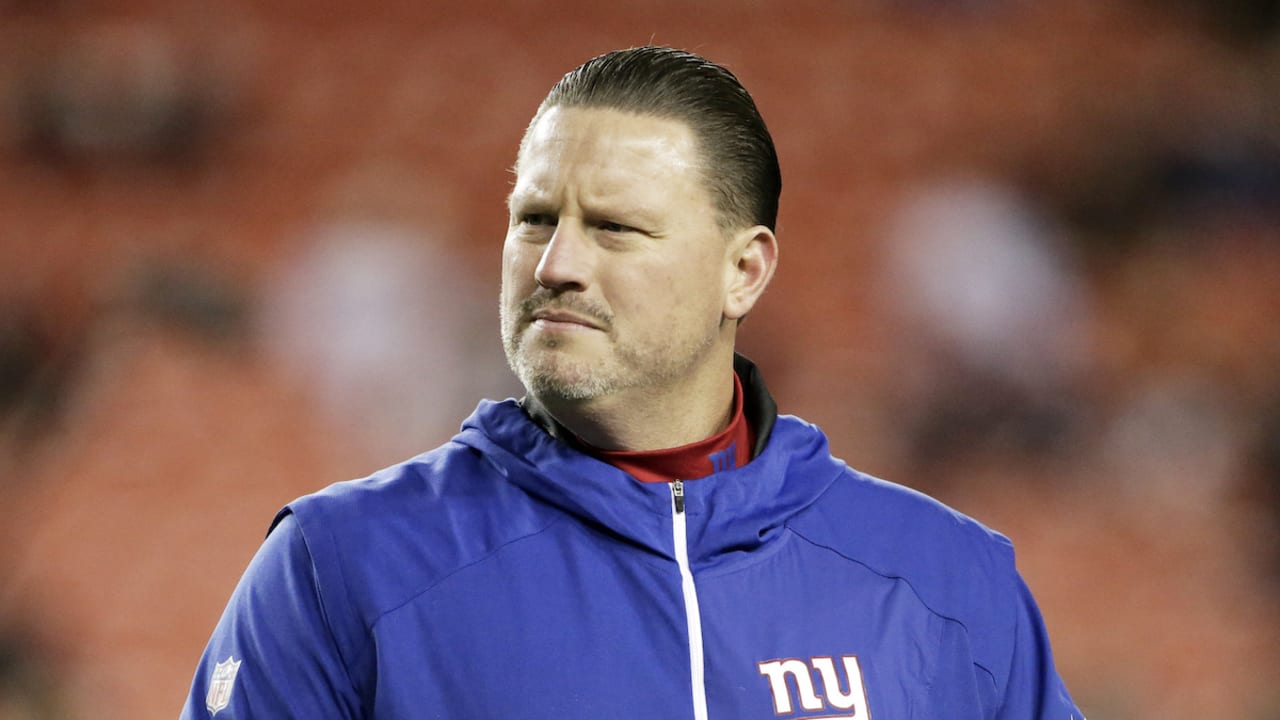
Photo Credit: Mark Tenally/AP
They didn’t. And in spectacularly and unfathomably horrible ways, McAdoo would oversee, and be culpable in, an implosion of staggering proportions.
The Giants’ personnel deficiencies were exposed almost immediately to start the season, as the offensive line constantly gave up instant penetration in the run and pass game alike. They couldn’t run the ball at all, and Manning was sacked five times in two of the first five games of the season. All this contributed to an 0-5 start, which was bad enough, but which was compounded when Beckham, who had dealt with an ankle injury to start the year, was lost for the season in Week 5.
What made things worse, however, was McAdoo’s inability to control the situation – specifically his locker room.
Dealing with players was not one of McAdoo’s strengths: Even before things truly went south, he had struggled to rein in Beckham, whose behavior as a diva wide receiver was beginning to turn into something the Giants could not handle. But beyond Beckham, McAdoo’s team was wholly undisciplined and unprofessional, and McAdoo soon found he had serious issues with players’ conduct and their level of effort in losses.
He tried to handle the situation with fines and suspensions: Cornerbacks Janoris Jenkins and Dominique Rodgers-Cromartie were suspended for violating team rules, but issues with player behavior persisted – particularly in the case of another first-round draft bust in (future Panthers cornerback) Eli Apple, though it should be noted that his issues on and off the field persisted well after McAdoo was out of the picture.
When the Giants dropped to 1-8 following a loss to the previously-winless San Francisco 49ers in Week 10, things started to come to a head: It was clear that McAdoo had lost the locker room and that a player mutiny was occurring.
“McAdoo has lost this team. He’s got us going 80% on Saturdays before we get on the plane to play a game, it’s wild. Changed our off day,” an anonymous player told Josina Anderson at the time. “He’s dishing out fines like crazy. Suspended two of our stars when we need them most. Throws us under the bus all the time.
“He’s (run) us into the ground and people wonder why we’ve been getting got.”
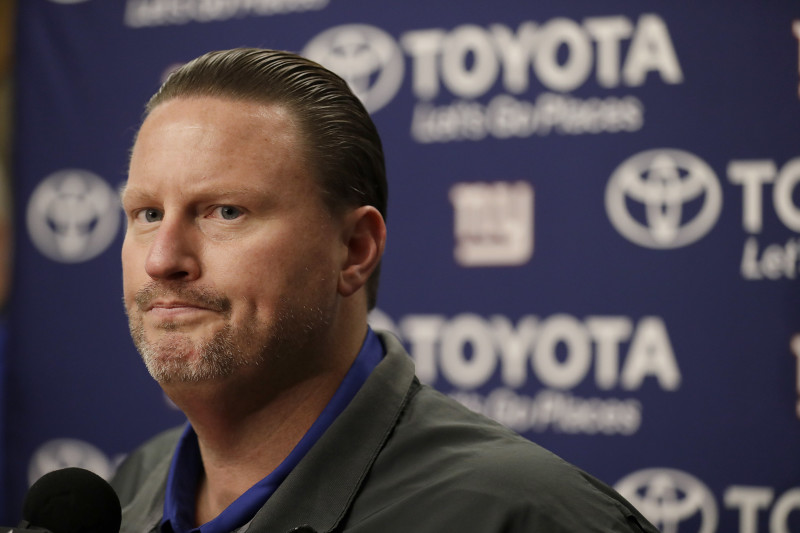
Photo Credit: Marcio Jose Sanchez/AP Photo
Prior to the Giants’ Week 13 game against the Oakland Raiders, McAdoo and embattled general manager Jerry Reese – with approval from Giants owner John Mara – devised a plan to bench Manning at halftime regardless of score as a means of both evaluating the other quarterbacks they had on the roster while also allowing Manning to preserve his streak of 210 consecutive starts. Manning, however, declined to start just to keep his streak alive, meaning he was ultimately benched in favor of backup quarterback and cross-town Jets castoff Geno Smith.
What McAdoo underestimated was the effect that benching Manning in the fashion he did – effectively embarrassing and insulting a franchise icon, two-time Super Bowl MVP, and incomparable hero – would have. The Giants fanbase went from having turned against McAdoo to engaging in outright revolt against him, with multiple billboards reading “Big Blue Shame on You” purchased along the New Jersey Turnpike. Ex-players and teammates of Manning were apoplectic as well, and a group of them allegedly planned a silent protest where they would wear Manning’s jersey along the sideline at the next home game.
McAdoo was fired the next day.
So, after spending the past two seasons with the Jaguars (as QB coach) and Cowboys (as a consultant), what merit is there to the Panthers hiring him as their new offensive coordinator?
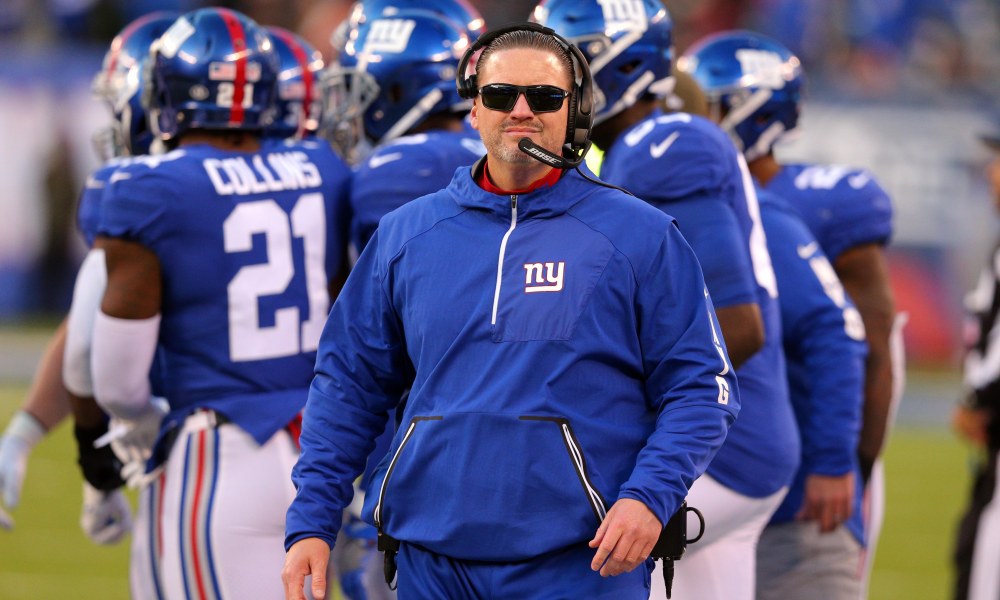
Photo Credit: Brad Penner/USA TODAY Sports
Going off of appearances, it would seem that Carolina’s hiring of McAdoo is indicative of Matt Rhule operating within his comfort zone and going back to the Tom Coughlin well. Although Rhule and McAdoo have never worked together, Coughlin’s influence on Rhule is readily apparent by Rhule having coached under him and employing three coaches – Kevin Gilbride Jr., Sean Ryan, and now McAdoo – who were also Coughlin staffers. While it remains to be seen if Coughlin had any input in Rhule’s offensive coordinator search, he did give counsel to Rhule when he was first hired by the Panthers in 2020.
It may not be the case, though, that McAdoo’s merits are wholly based in his work with Coughlin. For as time has gone on, circumstances have suggested McAdoo knew much more than what his reputation suggested.
In the 2017 Draft, McAdoo allegedly became smitten by future NFL MVP quarterback Patrick Mahomes, telling Giants management outright that “I would love to get my f—ing hands” on the Texas Tech product. Though he didn’t get his wish, McAdoo did end up pursuing and drafting Evan Engram, a “tweener” tight end whose speed and athleticism meshed well with where offensive football has since gone and earned him a Pro Bowl nod in 2020. There’s also an argument to be made that McAdoo’s success as an offensive coordinator, relative to the Giants being severely offensively-challenged over the last decade, vindicates him.
Although the Panthers have an offensive line just as poor as the ones McAdoo coached in New York, he will have much more to work with in terms of skill position players, specifically at running back and tight end. His assessment of Mahomes – as well as that of Sam Darnold – also suggests that he can play a major role in finding out who should and should not man the quarterback position for Carolina moving forward.
“He’s obviously a talented guy, he can make plays with his feet. I’d just have a hard time drafting a guy in the first round where you don’t necessarily like the way he throws,” McAdoo told the New York Post when speaking of Darnold in 2018. “He can overcome it, guys have, but that’s something that’s a challenge for me. I’m gonna be looking at that, trying to fix it, because it’s a fundamental flaw, and I believe in the fundamentals.
“The quarterback, his No. 1 job is to pass the football. If I don’t like the way he throws the ball, I have a hard time picking him, right?’’
As uncomfortable as it might be for Panthers fans to think about right now, McAdoo might have had a point.
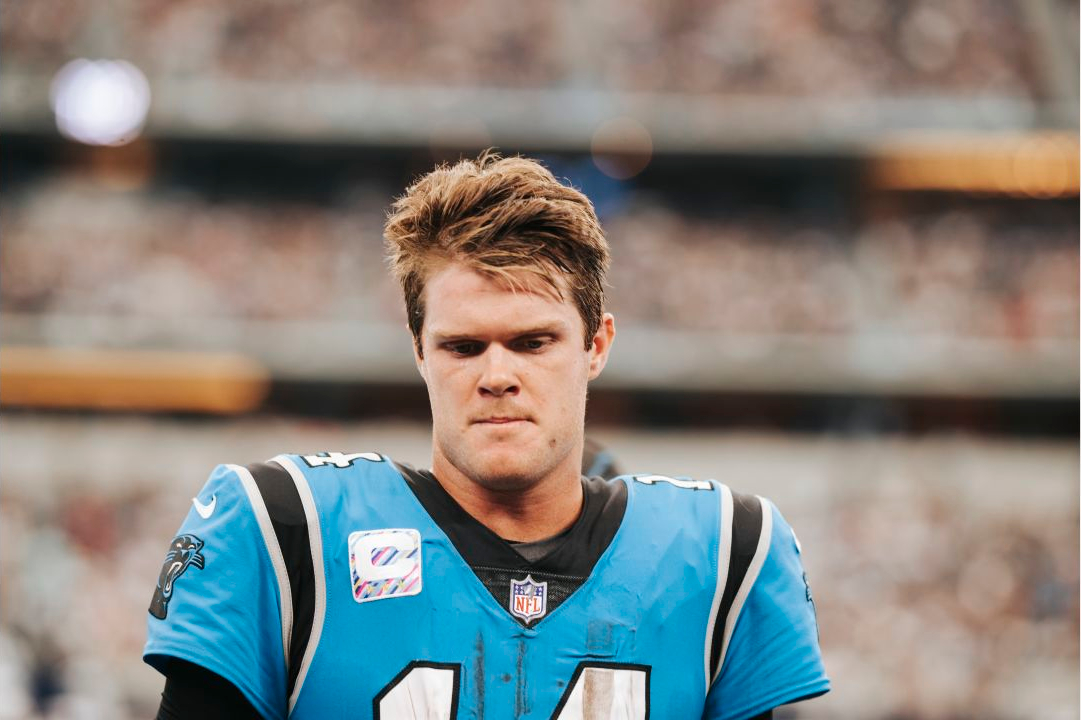
Photo Credit: Chanelle Smith-Walker/Carolina Panthers
When his past failings and the stage that they occurred on are taken out of the equation, the Panthers have ultimately found the following in Ben McAdoo: A coach with an eye for quarterback play who has a history of success as an NFL offensive coordinator and experience as a head coach. In the best-case scenario, McAdoo can raise the standard and overall performance of the Panthers’ offense, and in doing so help take the heat off Matt Rhule while also serving as a resource to Rhule as he tries to withstand the arrows and slings once shot McAdoo’s way.
That said, concern over the Panthers’ hiring of McAdoo is justified and perfectly reasonable. Such comes with the current low level of confidence in the Panthers’ coaching staff and decision-making, as it also invites reasonable doubt that Matt Rhule is capable of making the right sort of hires to maximize his team’s chances of success in 2022.
There is, though, a long time yet before the Panthers’ offensive players learn the McAdoos and McAdon’ts of their new offensive coordinator. And, in place of certainty, the hiring of the Panthers’ new offensive coordinator should at least be met with an open mind and with the idea that not all may be as it seems with Ben McAdoo.
(Top photo via Seth Wenig/AP)

